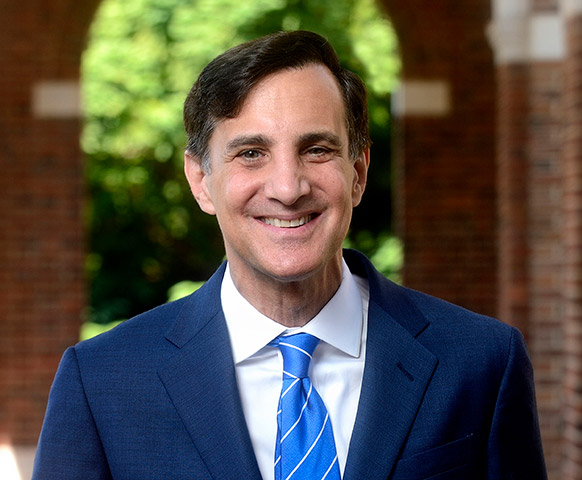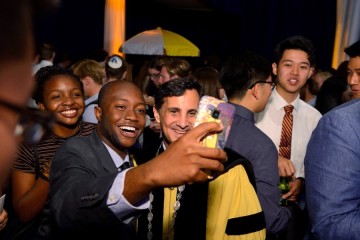
Image caption:
Ronald J. Daniels
President
What will be the state of our institutions in 2,500 years?
That was the question on my mind as I stood recently in the footprint of the ancient Greek agora in Athens. The agora was the meeting place that was the vibrant commercial, political, and cultural center at the heart of ancient Greece. The site is now credited as the birthplace of democracy.
More than 2,500 years later, the principles underlying our democracy and the institutions that protect them are under tension.
In the United States and around the world, the rise in division, distrust, and alienation presents a daunting and urgent challenge. The splintering and self-curation of media have allowed citizens to enter an echo chamber of reinforcing views. The structure and anonymity of social media have created a haven for corrosive dialogue. The very nature of the "truth" in public discourse is contested, and individuals are unable to resolve or mediate competing claims. The precise causes and character of these trends, which are not unique to the United States but echo around the world, are complex.
This is a complex challenge that requires the multifaceted expertise and a commitment to ideas that are the lifeblood of a research university. This is a challenge that our university is taking on as we launch the Stavros Niarchos Foundation Agora Institute at Johns Hopkins.
The Stavros Niarchos Foundation, led by co-president and Johns Hopkins University trustee Andreas Dracopoulos, has committed a landmark gift of $150 million to establish the Agora Institute. The institute will be an academic and public forum dedicated to addressing the deterioration of civic engagement worldwide and facilitating the restoration of open and inclusive discourse that is the cornerstone of healthy democracies. It will bring together scholars from a range of disciplines to examine the dynamics of societal, cultural, and political polarization and develop ways to improve decision making and civic discourse. These scholars also will design and test mechanisms for strengthening democracy through dialogue and social engagement, and convene experts from a range of perspectives to explore new approaches to divisive policy issues.
It is particularly exciting to commence this endeavor as the Class of 2021 convenes at Homewood. During their time here, some of them will be directly involved in the work of the Agora Institute. But more important, we hope that all of them will be inspired as they join our university community to engage in thoughtful and dynamic debate, to listen to the views of others and learn from them, and to contribute to the rich conversation of diverse ideas that is the heart of a great research university—and a great democratic society.

Ronald J. Daniels
President









